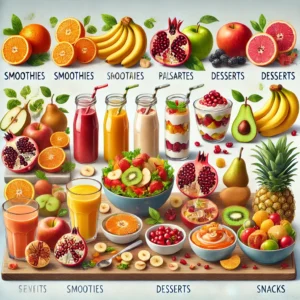 Discover the Best Winter Fruits List to Keep Your Health in Check
Discover the Best Winter Fruits List to Keep Your Health in Check
 Introduction
Introduction
As the cold winds of winter roll in, staying healthy becomes a priority for many. One of the best ways to fortify your immune system and nourish your body is by consuming seasonal fruits. These fruits are not only delicious but also packed with essential vitamins and antioxidants. This guide will help you discover the best winter fruits list that can keep your health in check all season long.
For a deeper look into super healthy winter fruits that you can enjoy daily, you can explore this resource. 
 What Are Winter Fruits?
What Are Winter Fruits?
Winter fruits are fruits that thrive during the colder months, often containing essential nutrients like vitamin C to support immunity. These fruits are naturally available from late autumn to early spring and are often at their peak flavor and nutrition during the winter season. Eating fruits in season is a simple way to enjoy fresh, flavorful produce that’s more affordable and environmentally friendly.
For a broader selection of the top 10 winter fruits you must try this season, be sure to visit this list.
 List of the Best Winter Fruits
List of the Best Winter Fruits
Here’s a comprehensive list of the most nutritious winter fruits to keep your health in check.
1. Oranges 
- Nutrients: Vitamin C, Fiber, Antioxidants
- Benefits: Boosts immunity, improves heart health, and promotes healthy skin.
- How to Eat: Fresh, as juice, or in salads.
2. Pomegranates 
- Nutrients: Antioxidants, Vitamin K, Potassium
- Benefits: Promotes heart health, reduces inflammation, and supports skin health.
- How to Eat: Fresh seeds, in smoothies, or as a topping on salads or yogurt.
3. Apples 
- Nutrients: Fiber, Vitamin C, Antioxidants
- Benefits: Supports weight management, promotes heart health, and aids digestion.
- How to Eat: Fresh, baked, or as part of a fruit salad.
Apples play a significant role in digestion due to their high fiber content, particularly in the form of soluble fiber called pectin. Here are some key ways apples contribute to digestive health:
1. **Promotes Regularity**: The fiber in apples helps regulate bowel movements by adding bulk to the stool, which can prevent constipation.
2. **Supports Healthy Gut Flora**: The soluble fiber in apples can serve as a prebiotic, promoting the growth of beneficial gut bacteria. A healthy gut microbiome is important for overall digestive health.
3. **Aids Satiety**: The fiber in apples can help you feel full, which may prevent overeating and contribute to better weight management, affecting overall digestive function.
4. **Reduces Gastrointestinal Issues**: Eating apples can help alleviate issues such as bloating and discomfort due to their fiber content, which aids in the proper emulsification and passage of food through the digestive system.
5. **Hydration**: Apples have a high water content, which is beneficial for digestion as it helps keep the digestive system functioning smoothly.Overall, incorporating apples into your diet can promote a healthy digestive system and contribute to overall well-being.
4. Grapes 
- Nutrients: Vitamin C, Vitamin K, Antioxidants
- Benefits: Boosts heart health, supports cognitive function, and provides energy.
- How to Eat: Fresh, as a snack, or in fruit salads.
5. Kiwifruit 
- Nutrients: Vitamin C, Fiber, Potassium
- Benefits: Boosts immunity, supports digestion, and promotes skin health.
- How to Eat: Fresh, in fruit salads, or blended in smoothies.
-
Kiwis are considered a superfood in winter for several reasons:
1. **High Nutritional Value**: Kiwis are packed with essential vitamins and minerals, including vitamin C, vitamin K, vitamin E, potassium, and dietary fiber. One medium kiwi contains more vitamin C than an equivalent amount of orange, making it an excellent choice for boosting the immune system during the cold season.
2. **Immune Support**: The high vitamin C content in kiwis can help strengthen the immune system, reducing the risk of colds and other winter illnesses. Vitamin C is known for its antioxidant properties, which help combat oxidative stress in the body.
3. **Digestive Health**: Kiwis are a good source of fiber, which aids digestion and can help prevent constipation—a common issue during winter when dietary habits often change. The enzyme actinidin in kiwis can also help break down proteins and improve digestion.
4. **Low Calorie but Filling**: Kiwis are low in calories but high in fiber, making them a great snack option for those looking to manage their weight. They can help keep you feeling full longer and provide a nutritious alternative to heavy winter comfort foods.
5. **Hydration**: Although they are commonly seen as a tropical fruit, kiwis have a high water content, which can help keep you hydrated during the dry winter months.
6. **Versatility**: Kiwis can be easily incorporated into various winter dishes, from salads and smoothies to desserts, making them a tasty and nutritious option for any meal.
Overall, the combination of their impressive nutrient profile and health benefits makes kiwis a fantastic choice for maintaining well-being during the winter season.
6. Cranberries 
- Nutrients: Vitamin C, Fiber, Antioxidants
- Benefits: Promotes urinary tract health, heart health, and reduces inflammation.
- How to Eat: Dried as snacks, in sauces, or as juice.
7. Pears 
- Nutrients: Vitamin C, Fiber, Potassium
- Benefits: Supports digestive health, heart health, and promotes satiety.
- How to Eat: Fresh, poached, or added to desserts.
8. Bananas 
- Nutrients: Potassium, Vitamin B6, Fiber
- Benefits: Supports energy production, muscle recovery, and digestion.
- How to Eat: Fresh, blended in smoothies, or as a natural sweetener.
9. Persimmons 
- Nutrients: Vitamin A, Vitamin C, Fiber
- Benefits: Improves vision, strengthens immunity, and supports gut health.
- How to Eat: Fresh, sliced into salads, or baked into desserts.
10. Lemons 
- Nutrients: Vitamin C, Antioxidants
- Benefits: Boosts immunity, detoxifies the body, and promotes better digestion.
- How to Eat: Use as a garnish, in detox water, or to enhance flavors in dishes.
 Health Benefits of Eating Winter Fruits
Health Benefits of Eating Winter Fruits
Winter fruits are packed with essential vitamins, minerals, and antioxidants that provide a wide range of health benefits. 
1. Boost Immunity
Vitamin C-rich fruits like oranges, lemons, and kiwis strengthen the immune system, helping the body fight off colds and flu.
2. Support Heart Health
Fruits like pomegranates and grapes are rich in antioxidants that reduce inflammation and lower blood pressure, promoting better cardiovascular health.
3. Aid in Weight Management
Fruits high in fiber, like apples and pears, provide a feeling of fullness, making it easier to avoid overeating during the colder months.
4. Enhance Skin Health
The antioxidants and vitamins found in citrus fruits and pomegranates promote radiant, youthful skin.
 How to Incorporate Winter Fruits into Your Diet
How to Incorporate Winter Fruits into Your Diet
There are many simple ways to include seasonal fruits in your meals and snacks. Here are a few ideas:
- Morning Smoothies: Blend bananas, pomegranate, and oranges for a nutritious smoothie.
- Fresh Salads: Add slices of pears, apples, and grapes to fresh salad recipes for a burst of flavor.
- Wholesome Snacks: Enjoy fruits like apples and bananas as healthy, on-the-go snacks.
- Desserts: Use pomegranate seeds and orange zest as toppings for cakes, yogurts, and desserts.
If you’re looking for inspiration on how to create healthy, flavorful salads using seasonal fruits, check out these fresh salad recipes. 
 Frequently Asked Questions (FAQs)
Frequently Asked Questions (FAQs)
1. What fruits are in season during winter?
Some of the most popular winter fruits include oranges, grapefruits, lemons, pomegranates, apples, and pears.
2. Are winter fruits healthier than supplements?
While supplements can be beneficial, natural fruits provide a broader range of nutrients, antioxidants, and fiber, which are essential for overall health.
3. Can I freeze winter fruits?
Yes, many seasonal fruits like pomegranate seeds, citrus fruits, and bananas can be frozen for long-term storage.
4. How can I store fresh fruits during winter?
Store citrus fruits in a cool, dry area and keep apples and pears in the refrigerator to extend their freshness.
 Conclusion
Conclusion
Adding seasonal fruits to your daily diet can have a powerful impact on your health. With options like oranges, pomegranates, and apples, you’ll have no shortage of delicious and nutritious choices. Incorporate these fruits into smoothies, salads, and snacks for maximum benefits. Remember, eating fruits when they are in season ensures better flavor, freshness, and affordability.
Take control of your health this winter with these must-have fruits, and don’t forget to explore the top 10 winter fruits you must try by checking out this comprehensive guide.
